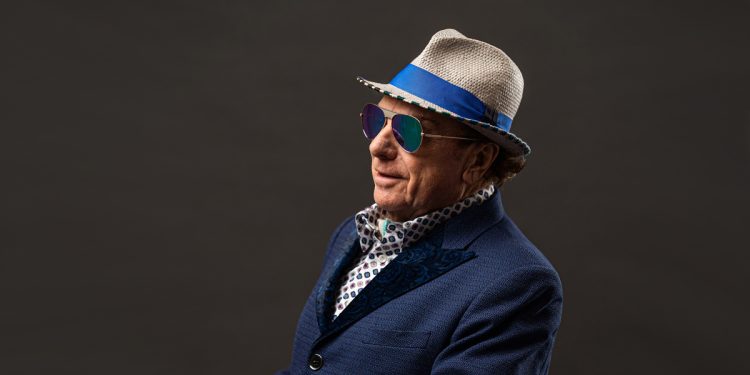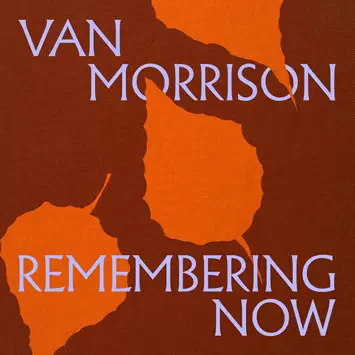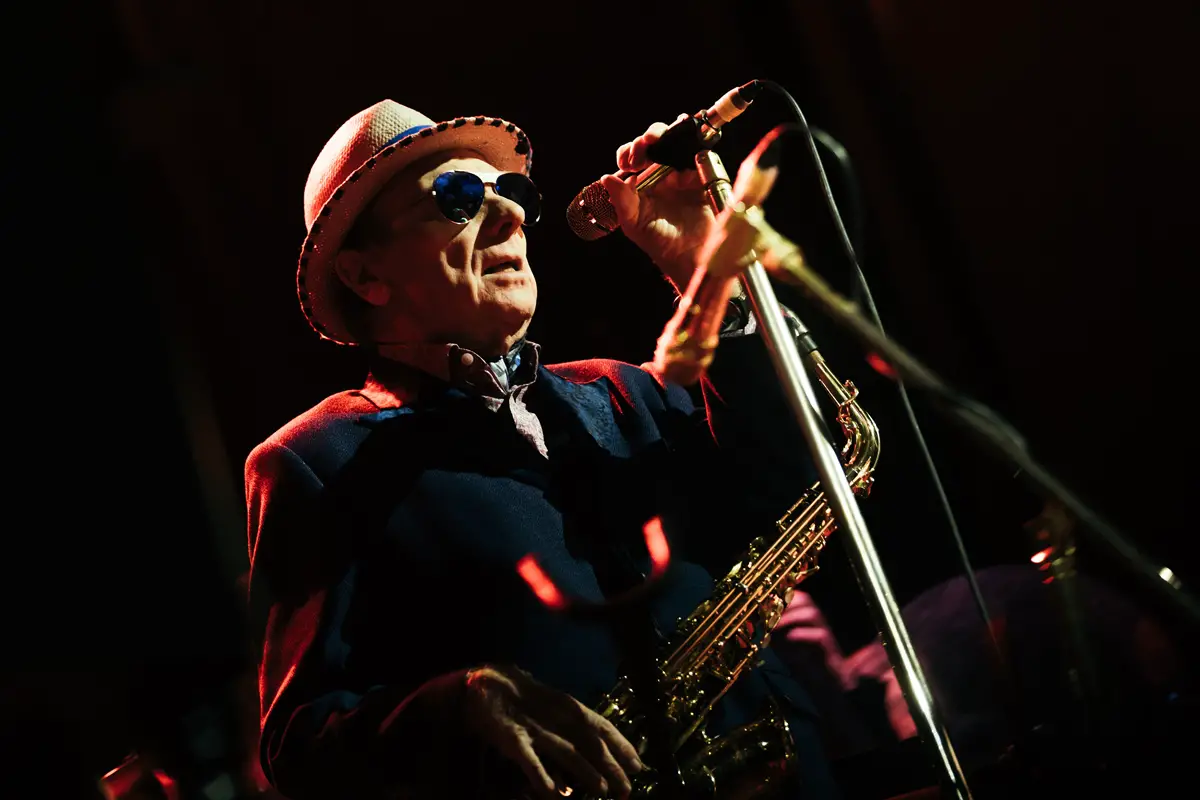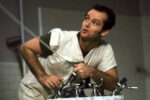An Interview with Van Morrison

Van Morrison sits down with writer Dylan Jones for an exclusive interview, sharing the stories behind Remembering Now and much more, ahead of the new album’s release on Friday 13 June.
Van, great to see you today. For what it’s worth, I love your new record. It really does feel like it’s up there with the very best of things that you’ve done. It feels like a very special record. It’s all new material. It feels like a classic Van Morrison record, but it also sounds very contemporary. Can you explain your thought processes behind the creation of Remembering Now?
Well, there really isn’t a thought process. It’s more like, for want of a better word, a psychic process or the other side of the brain process. The thought process comes in when putting it together later on. In the beginning it’s just instinct, intuition, sometimes randomness. It’s more like being a receiver – you’re receiving info, ideas, and concepts.
For the last couple of years you’ve been making records which perhaps celebrate the past — maybe genre records — but because this is all new material (apart from ‘Down to Joy’) that’s what makes it special, I think. So why did you want to do an album of new material now?
Well, it was going on in parallel. The recording process isn’t completely exclusive. The songs were running parallel to other projects, and a lot of them were recorded during the same time period. The last few projects I put out, it wasn’t a matter of the past – it was my nostalgia. People have their own nostalgia, and so do I. It was going back to the beginning, what gave me the impulse to do this.
What was the inspiration behind thinking you could actually do it?
I was getting quite a lot of negative feedback during this period, so myself and the musicians just wanted to do something that was going to be fun. We weren’t trying to make any statement. We were just going to have fun and go back to the beginning — this is why we got into this in the first place. But the other songs were being written and recorded during the same period.
There are fourteen great songs on the album, very varied. What’s your favourite?
I don’t really have a favourite. I guess ‘Stretching Out’ would probably be my favourite at this point.
To me, it sounds like Veedon Fleece. It sounds like pure Van. Such a great song. ‘Down to Joy’ — another great record — was first heard in Kenneth Branagh’s Belfast (2021). Was it always your intention to put it on an album?
Oh yeah, of course. But it’s more complicated than that. There’s a backlog of material, and it’s finding a way to get the material out. Distribution can only deal with so much at a time. It’d be difficult to get out two records a year. One is manageable. There are new arrangements and projects that have just been sitting there gathering dust that were supposed to come out a long time ago — it’s just priorities and timing. Recently we were involved in skiffle and rock’n’roll and wanted to put that out at the time. So it’s complicated.
Talking about that particular song—how did it work? Did you get to watch the film before writing it?
Yeah. I watched the first draft of the film. During lockdown I did an interview with Nile Rodgers and Paul Williams. I was explaining to Nile that Kenneth came from North Belfast. I drove over there and remembered visiting in the sixties. I had friends there. We played music together. I had this vision of walking down the road in North Belfast, and that’s how the song started — “coming down to joy.” I had an image of these young guys coming down the street, having fun, laughing. That’s how it started.
What’s the process of making a record? Is it always the same when you’re recording original material? Is it always finished when you get into the studio?
No, it’s not always finished. It’s a work in progress until you get the right take or the right arrangement. The song stays the same, but arrangements can change. Usually, I do a demo with myself — mainly on guitar, some on piano. Then I go in the studio, start with the drummer, play him the song. We run the song with guitar and drums to find the tempo, beat, and approach. Then I bring in the bass player, run it with bass and drums, get the bass part together. Then I bring in keyboard, figure out what he’s going to play, then guitar. Once everyone’s learned the song, we’re ready to do a take.
 “A bit of a wildcard”
“A bit of a wildcard”
Fascinating. I talked to Jimmy Page last summer — he said when he recorded, drums were always first.
Yeah. Fascinating.
Where do you like to record these days?
Doesn’t matter. The engineer is really good — he can record anywhere. Most of the rhythm section was in Cardiff, so we recorded there. Two keyboards, bass, drums were there. I brought in a guitar player from Limerick and myself — so basically, it was based in Cardiff. Sometimes we recorded in Bath, either at Real World or at a hotel there.
Do you like recording in America?
It depends. I liked Studio D in Sausalito. I did a lot of stuff at the Record Plant. But it’s not really about the place — it’s about mixing up the musicians.
Why did you want to work with Don Black again?
Don Black was a bit of a wildcard. I wasn’t looking for a co-writer. I used to listen to his radio show on songwriting. I met him at the BMI Awards — we were both up for Icon Awards. Later I got a CD with his song ‘Days Like These’ on it. I thought, “I could have written this.” So I asked him to send me lyrics if he had anything that might suit me. He sent ‘Every Time I See a River’. I put music to it, recorded it — it worked. So he keeps sending me lyrics, and most of the time it works. It wasn’t really a choice. It just happened. The universe kind of set it up.
Similarly, why collaborate with Michael Beckwith, founder of the Agape Centre?
We’d talked for years about writing a song together. Every time we met we’d say we would but never got around to it. So I ended up taking words from one of his books and putting music to them. I sent it to him — he liked it. So it worked.
So when you do those collaborations, you’re not actually working together in person?
No. They just send me lyrics, and I do the rest. Don doesn’t write music. I was going through my library and found The Science of Mind by Ernest Holmes. I used to be into it years ago and wanted to get back into it. I looked for local centres – found an interview with Michael Beckwith instead – it resonated. Later, at a party in Malibu, someone mentioned Agape. I asked Roma Downey about it — she knew Michael and set up a meeting. I met him and visited Agape. It just went from there.
There’s obviously such a strong sense of — if you’ll forgive the word — spirituality in this record. There often seems to be in your work. How have your personal beliefs changed over the years?
Well, it’s not a belief. It’s an energy. It’s a frequency. That’s how I see it – a frequency.
And is that frequency a creative frequency?
Yeah, it is.
And do you feel that you are channelling that?
Absolutely.
Do you have to wait for that, or can you summon it?
Most of the time, yeah. Sometimes you wait, but most of the time, you have to summon it. Other people meditate or use other methods. I have to actively summon it.
As a creative person, having done this for a long time, does that make the process shorter?
It depends on the individual. I had to work my way through this. You have to deal with the energy. Back in the ’70s, I didn’t know how to deal with it — it was burning me out. People around me were burning out on drugs. One of them almost died. So I was given this book by Carl Jung, Man And His Symbols. I started to discover what it was about — projection. When you’re famous, people constantly project on you. This happens to everyone, but with famous people it’s amplified. It can destroy you if you don’t understand what’s happening. Or you can work your way through it. So I had to learn to deal with the energy and the negativity. The media constantly projects negativity — they think that sells. So they create what I call a “third party.” There’s you, and there’s the audience — that’s a two-way street. But the media creates a third thing that people start relating to instead of you. That took a long time to work through and come out the other end, learning to handle it.
Where you are different — maybe like Bob Dylan — is that most artists have an “imperial period,” seven to nine years of great music and creativity, then they fall off. But you’re still making records as good as fifty or sixty years ago. You must be aware of that.
Yeah. Basically, I’m coming from jazz. Not pop, not rock, not what’s commercial. That’s where I started, and that’s still where I am. I feel the same as I did when I was listening to Louis Armstrong, Lead Belly, Jelly Roll Morton. And the blues. And then the skiffle scene — Ken Colyer, Chris Barber, Lonnie Donegan. So it’s a jazz approach — not trying to be popular for a set time. Not being manipulated by the system. If your system is empty to start with, you can avoid getting sucked in.
You have this ability to keep moving forward musically yet always make records that are quintessentially Van Morrison. How good an editor are you?
I’m very bad.
Of your songs?
Oh, very good. Very good. See, that’s when the thought process comes in.
You must have a vast amount of material you’ve recorded but haven’t released.
That’s right. Yeah. It’s just massive.
Out of interest, Dylan has a parallel career of releasing unreleased material and many think it’s better than what came out at the time. Would you consider doing that?
Yeah, I would – I just don’t have a system together to do it yet. Everyone talks about it — “Are you gonna put your money where your mouth is?” But nobody’s come up with a plan. It’s just too huge. There’s so much good stuff. Distribution can only realistically handle one record a year. I don’t have a team. I’d need a team of people to figure it out. And we don’t have that yet.
With Remembering Now, there’s a big emphasis on string arrangements. You’ve used strings throughout your career, but they seem particularly prominent here. Was that a conscious decision? They work beautifully on the record.
It was just that I wanted to work with the arranger again. I hadn’t worked with him in a while, so I got in touch, sent him some of the songs, and we went from there. I wanted to reconnect. He’s very good — we’ve worked together a lot, so I don’t have to explain much.
“It’s about staying connected”
Almost from your first records, you’ve referenced your childhood, your adolescence and the important role of place in your life. That’s true of this album too. How has your relationship with Belfast changed?
Everybody’s has changed — even those who stayed and didn’t go anywhere. The sense of place has changed. I made a documentary in the 1980s — I think it was called A Sense of Place. It featured poets like Michael Longley, Gerald Dawe, Seamus Deane, Derek Mahon. It was about that theme — place. My old English teacher, Davy Hammond, was a folk singer, broadcaster and documentarian. He may have coined the phrase “sense of place.” The documentary subject matter ties into Remembering Now. It’s about the landscape, the earth, the whole thing — not just the city. That’s what Kenneth Branagh was getting at with his film Belfast. It’s a full connection to the land and people.
The album does seem to have a strong theme around Belfast. Was that intentional?
It’s just the way the songs came about. Part of me has never really left the street corner. I’m still that guy hanging out there. I still see some of those guys around. Part of me is still there.
Well, it sounds like it. Many artists who’ve had careers as long as yours don’t have that kind of rootedness.
Yeah, well, you see, it’s about staying connected to that original energy, that original impulse that got you into it in the first place. And if you can do that, then you’re always drawing from the same well. It’s the same creative source.
So for you, it’s not nostalgia — it’s a living connection.
Exactly. It’s not about trying to recreate the past. It’s about being in the present with that energy still flowing. So you can still create new things that are just as vital.
How do you maintain that sense of integrity over such a long period?
I just try to stay true to the music. That’s the bottom line. I don’t care about trends or charts. I don’t care about what people think is cool. I care about the music — what feels right to me.
And that’s what’s sustained you?
Yeah, that’s what keeps it alive for me. That’s why I’m still doing it.
Are you still as passionate about making music as you ever were?
More so, maybe, because I know what I’m doing now. Back then, I didn’t always know — I was figuring it out. Now I know what works, what doesn’t. I have the freedom to just do it.
Do you still get nervous before releasing something new?
Not nervous, but curious. I wonder how it will land — what people will hear in it? But I don’t worry – that’s not my job. My job is to make the music.
And is there more music coming?
Always… There’s always more music.
‘Remembering Now’ by Van Morrison is released on Friday 13 June










